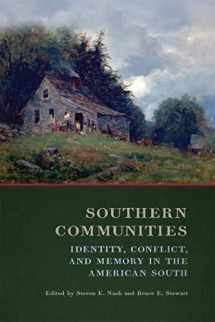
Southern Communities: Identity, Conflict, and Memory in the American South
Book details
Summary
Description
Community is an evolving and complex concept that historians have applied to localities, counties, and the South as a whole in order to ground larger issues in the day-to-day lives of all segments of society. These social networks sometimes unite and sometimes divide people, they can mirror or transcend political boundaries, and they may exist solely within the cultures of like-minded people.
This volume explores the nature of southern communities during the long nineteenth century. The contributors build on the work of scholars who have allowed us to see community not simply as a place but instead as an idea in a constant state of definition and redefinition. They reaffirm that there never has been a singular southern community. As editors Steven E. Nash and Bruce E. Stewart reveal, southerners have constructed an array of communities across the region and beyond. Nor do the contributors idealize these communities. Far from being places of cooperation and harmony, southern communities were often rife with competition and discord. Indeed, conflict has constituted a vital part of southern communal development. Taken together, the essays in this volume remind us how community-focused studies can bring us closer to answering those questions posed to Quentin Compson in Absalom, Absalom!: ?Tell [us] about the South. What's it like there. What do they do there. Why do they live there. Why do they live at all.?


We would LOVE it if you could help us and other readers by reviewing the book
Book review



